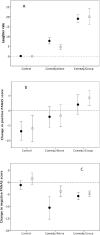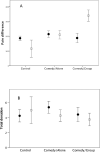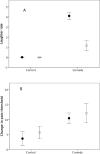Laughter influences social bonding but not prosocial generosity to friends and strangers
- PMID: 34388212
- PMCID: PMC8362988
- DOI: 10.1371/journal.pone.0256229
Laughter influences social bonding but not prosocial generosity to friends and strangers
Abstract
Humans deploy a number of specific behaviours for forming social bonds, one of which is laughter. However, two questions have not yet been investigated with respect to laughter: (1) Does laughter increase the sense of bonding to those with whom we laugh? and (2) Does laughter facilitate prosocial generosity? Using changes in pain threshold as a proxy for endorphin upregulation in the brain and a standard economic game (the Dictator Game) as an assay of prosociality, we show that laughter does trigger the endorphin system and, through that, seems to enhance social bonding, but it does not reliably influence donations to others. This suggests that social bonding and prosociality may operate via different mechanisms, or on different time scales, and relate to different functional objectives.
Conflict of interest statement
The authors have declared that no competing interests exist.
Figures





References
-
- Mikolajczak M, Gross JJ, Lane A, Corneille O, de Timary P, Luminet O. Oxytocin makes people trusting, not gullible. Psych Sci. 2010;21: 1072–1074. - PubMed
-
- Daughters K, Manstead AS, ten Velden FS, De Dreu CK. Oxytocin modulates third-party sanctioning of selfish and generous behavior within and between groups. Psychoneuroendocrin. 2017;77: 18–24. - PubMed
Publication types
MeSH terms
LinkOut - more resources
Full Text Sources

